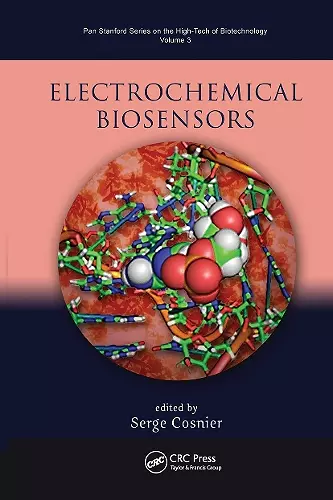Electrochemical Biosensors
Format:Hardback
Publisher:Pan Stanford Publishing Pte Ltd
Published:26th Jan '15
Currently unavailable, and unfortunately no date known when it will be back

Since four decades, rapid detection and monitoring in clinical and food diagnostics and in environmental and biodefense have paved the way for the elaboration of electrochemical biosensors. Thanks to their adaptability, ease of use in relatively complex samples, and their portability, electrochemical biosensors now are one of the mainstays of analytical chemistry. In particular, electrochemistry has played a pivotal role in the development of transduction methods for biological processes and biosensors. In parallel, the explosion of activity in nanoscience and nanotechnology and their huge success have profoundly affected biosensor technology, opening new avenues of research for electrode materials and transduction.
This book provides an overview of biosensors based on amperometry, conductimetry, potentiometry, square-wave voltammetry, impedance, and electrochemiluminescence and describes the use of ultramicroelectrodes for the real-time monitoring and understanding of exocytosis. Areas of particular interest are the use of silver and gold nanoparticles for signal amplification, photocurrent transduction, and aptamer design. Moreover, advanced insights in the innovative concept of self-powered biosensors derived from biofuel cells are also discussed.
"This is an excellent book on modern electrochemical biosensors, edited by Professor Cosnier and written by leading international experts. It covers state-of-the-art topics of this important field in a clear and timely manner."
—Joseph Wang,UC San Diego, USA
"This book covers, in 13 well-illustrated chapters, the potential of electrochemical methods intimately combined with a biological component for the assay of various analytes of biological and environmental interest. Particular attention is devoted to the description of electrochemical microtools in close contact with a biological cell for exocytosis monitoring and to the use of nanomaterials in the electrochemical biosensor architecture for signal improvement. Interestingly, one chapter describes the concept and design of self-powered biosensors derived from biofuel cells. Each topic is reviewed by experts very active in the field. This timely book is well suited for providing a good overview of current research trends devoted to electrochemical biosensors."
—Jean-Michel Kauffmann, Editor-in-Chief, Talanta, Free University of Brussels, Belgium
"Written by leading international experts in different fields of electrochemical transduction for biological phenomena and biosensors, this timely book is well suited for graduate students and scientists, providing a good overview of current research trends and perspectives in the area."
—J. Albaigés, CID-CSIC, Barcelona, Spain, in International Journal of Environmental Analytical Chemistry
ISBN: 9789814411462
Dimensions: unknown
Weight: 686g
412 pages